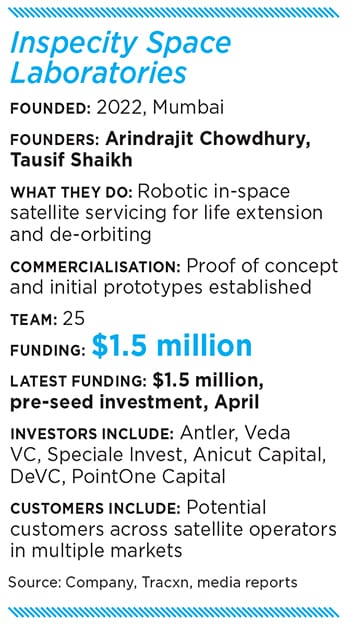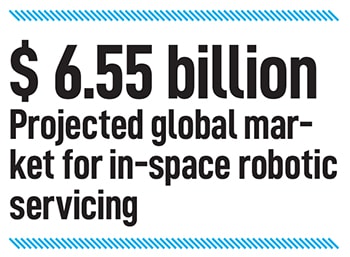Inspecity Space Laboratories: Providing in-space succour to satellites
Entrepreneurs of the Mumbai startup dream of space cities, but they also know it starts with one propulsion system, one rig, one sensor suite at a time


Professor Arindrajit Chowdhury at IIT-Bombay and his student Tausif Shaikh, a propulsion systems expert, started Inspecity Space Laboratories only last year. This year, they’re preparing to launch a small CubeSat propulsion system that is about the size of a small tiffin box.
It will take them one small step forward in developing an ecosystem of in-space life extension of satellites, involving repairs, navigations and eventually controlled de-orbiting manoeuvres. The demand for such services is expected to grow to several billions of dollars over the next decade.
The duo is looking to launch the CubeSats both on an Isro platform as well as a standalone satellite. Next, they want to work with a partner satellite operator to test if their module can approach it, rendezvous with it, and perform some proximity operations.

To begin with, “we are not going to do any kind of docking or robotic applications. We are just going to get close, go around, observe, and measure parameters like distance, attitude, the rate of change of attitude and so on", Chowdhury says.
Space, around the Earth, is getting crowded, and in addition to the natural celestial matter crossing paths with us, debris and parts and old satellites that no longer work all constitute a growing problem. This will become a more urgent problem as businesses such as SpaceX and others send tens of thousands of satellites to low Earth orbits in the coming years.
Inspecity is tapping the opportunity to provide in-space repairs where possible, or a controlled de-orbiting of a satellite where nothing else can be done. The current flagship they’re developing is a “vehicle for life-extension and deorbiting activities" or VEDA and its mini-me RIG (Robotic Insert for satellite Guidance).
“So, we would create an ecosystem or an infrastructure where you can extend the lives of satellites by these autonomous robotic capabilities. That is the initial technology that we are trying to figure out," he says.

Tausif adds: “To do this, the three key technologies that we are going to develop in our first stage are a propulsion system, a robotic arm, and a sensor suit that gives us very good visibility" to be able to manoeuvre VEDA.
 And they have already demonstrated that their propulsion tech works, winning one of the iDEX challenges—part of the innovation for defence excellence make-in-India programme.
And they have already demonstrated that their propulsion tech works, winning one of the iDEX challenges—part of the innovation for defence excellence make-in-India programme.
Circling back to these founders’ dream of building things in space, it’s not about doing something fancy. There’s scientific evidence to show that many activities can be done better in space—under circumstances of little or no gravity. That apart, “imagine being able to shift all our polluting industries to space… you can return planet Earth to its pristine green past", Chowdhury says.
First Published: Oct 05, 2023, 14:41
Subscribe Now